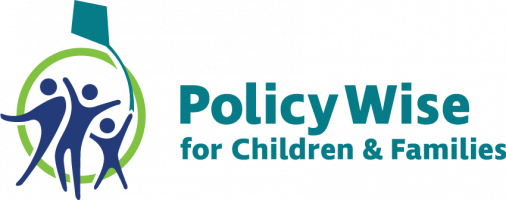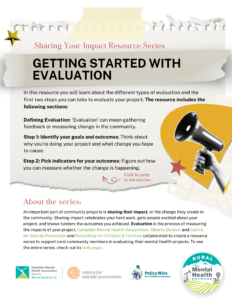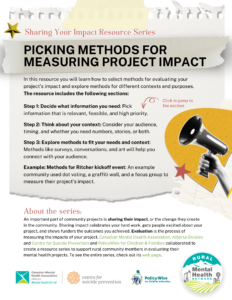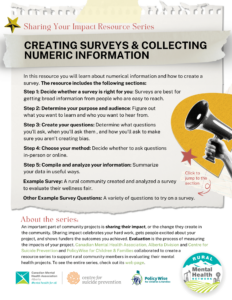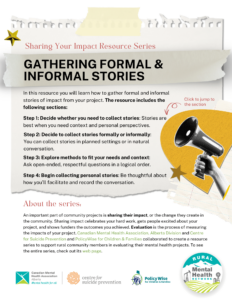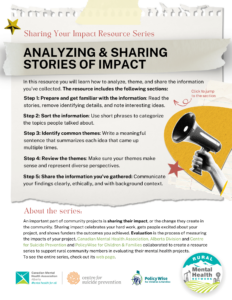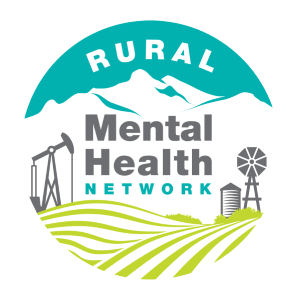Rural Mental Health Project
Sharing Your Impact Resource Series
An important part of community projects is sharing their impact or the change they create in the community.
Sharing impact celebrates your hard work, gets people excited about your project, and shows funders the outcomes you achieved. Evaluation is the process of measuring the impacts of your project.
The Canadian Mental Health Association, Alberta Division and Centre for Suicide Prevention with PolicyWise for Children & Families collaborated to create the “Sharing Your Impact Resource Series” for the Rural Mental Health Network. These resources support rural community members in evaluating their mental health projects.
Project Resources
1. Getting Started with Evaluation
Learn about the different types of evaluation and the first two steps you can take to evaluate your project. This resource includes:
- Defining evaluation
- Step 1: Identify your goals and outcomes
- Step 2: Pick indicators for your outcomes
2. Picking Methods for Measuring Project Impact
Learn how to select methods for evaluating your project’s impact and explore methods for different contexts and purposes. This resource includes:
- Step 1: Decide what information you need
- Step 2: Think about your context
- Step 3: Explore methods to fit your needs and context
3. Creating Surveys & Collecting Numeric Information
Learn about numerical information and how to create a survey. This resource includes:
- Step 1: Decide whether a survey is right for you
- Step 2: Determine your purpose and audience
- Step 3: Create your questions
- Step 4: Choose your method
- Step 5: Compile and analyze your information
4. Gathering Formal & Informal Stories
Learn how to gather formal and informal stories of impact from your project. This resource includes:
- Step 1: Decide whether you need to collect stories
- Step 2: Decide to collect stories formally or informally
- Step 3: Explore methods to fit your needs and context
- Step 4: Begin collecting personal stories
5. Analyzing & Sharing Stories of Impact
Learn how to analyze, theme, and share the information you’ve collected. This resource includes:
- Step 1: Prepare and get familiar with the information
- Step 2: Sort the information
- Step 3: Identify common themes
- Step 4: Review the themes
- Step 5: Share the information you gathered
Acknowledgments
PolicyWise’s project team would like to thank the Rural Mental Health Animators who inspired us with their creativity and dedication to their work. We’re also grateful to the Canadian Mental Health Association, Alberta Division and Centre for Suicide Prevention. for their commitment to meaningful partnership and rural-led approaches.
Project Team
Jennifer Medlock, PhD, Research & Policy Manager, PolicyWise for Children & Families
Jonah Elke, MSc, Senior Research & Policy Associate, PolicyWise for Children & Families
Emilie Bassi, MSc, Research & Policy Associate, PolicyWise for Children & Families
Sarah Andrews, MPH, Research & Policy Associate, PolicyWise for Children & Families
Emma Monaghan, Intern, PolicyWise for Children & Families
Project Partners
This project was a collaboration with the Canadian Mental Health Association, Alberta Division and Centre for Suicide Prevention.
